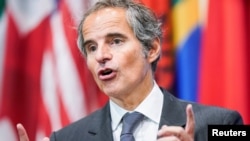The head of the United Nations nuclear watchdog on Tuesday underscored the urgency of resuscitating diplomatic efforts to limit Iran's nuclear program, saying the situation could quickly worsen if negotiations fail.
Rafael Mariano Grossi, director general of the International Atomic Energy Agency, said the diplomatic effort "is not at its best point," but it wasn't his place to declare whether the process was "dead or alive." However, he said progress is not impossible.
"I hope to be able to re-set, restore, reinforce that indispensable dialogue," he said during a discussion at the Chatham House think tank. "Without that, things are going to get worse.''
Iran began rebuilding its nuclear stockpile after former U.S. President Donald Trump abandoned a 2015 agreement that limited the Islamic Republic's atomic energy program. Talks on restoring the deal ended in August when Western countries presented the "final text" of a roadmap for progress, which Iran has yet to accept.
Grossi warned last month that Iran had enough highly enriched uranium to build several nuclear weapons if it chose to do so. But diplomatic efforts aimed at once again limiting the country's atomic program seem more unlikely than ever as Tehran provides arms for Russia's war in Ukraine and as unrest shakes the Islamic Republic.
Grossi said the Middle East has a "unique set of problems" that will be aggravated if diplomatic efforts fail.
"I don't see it in anybody's interest that there will be proliferation there. I think we would be aggravating … the already fragile situation,'' he said. "We're not there yet. But we cannot really afford to fail.''





